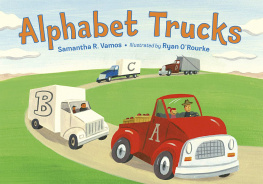Latino Truck Driver Trade
Sex and HIV
in Central America
Latino Truck Driver Trade
Sex and HIV
in Central America
Jacobo Schifter, PhD
First published by
The Haworth Hispanic/Latino Press, an imprint of The Haworth Press, Inc., 10 Alice Street, Binghamton, NY 13904-1580
This edition published 2013 by Routledge
Routledge
Taylor & Francis Group
711 Third Avenue
New York, NY 10017 | Routledge
Taylor & Francis Group
2 Park Square, Milton Park
Abingdon, Oxon OX14 4RN |
Routledge is an imprint of the Taylor & Francis Group, an informa business
2001 by The Haworth Press, Inc. All rights reserved. No part of this work may be reproduced or utilized in any form or by any means, electronic or mechanical, including photocopying, microfilm, and recording, or by any information storage and retrieval system, without permission in writing from the publisher.
English translation by Christina E. Feeny.
Cover design by Marylouise E. Doyle.
Library of Congress Cataloging-in-Publication Data
Schifter, Jacobo.
Latino truck driver trade : sex and HIV in Central America / Jacobo Schifter.
p. cm.
Includes bibliographical references and index.
ISBN 0-7890-0882-3 (hard : alk. paper) ISBN 0-7890-0883-1 (soft: alk. paper)
1. SexCentral America. 2. Truck driversCentral AmericaSexual behavior. 3. MachismoCentral America. 4. HIV infectionsCentral America. I. Title.
HQ18.C35S34 2000
306.709728dc21
00-057573
CONTENTS
ABOUT THE AUTHOR
Jacobo Schifter, PhD, is the Regional Director of ILPES (the Latin American Health and Prevention Institute), an AIDS prevention program financed by the Netherlands' government. One of the most prolific writers in Latin America, Dr. Schifter wrote books on the Costa Rican civil war, U.S.-Costa Rican relations, and Costa Rican anti-Semitism before shifting his interests when AIDS started to affect the Central American region. He then established the first regional institute to fight the epidemic and created dozens of innovative programs, such as AIDS hotlines and AIDS prevention workshops for Latin gays, prisoners, street children, Indians, male sex workers, and other minority groups.
Dr. Schifter also started to publish controversial books on AIDS, including The Formation of a Counterculture: AIDS and Homosexuality in Costa Rica (1989), Men Who Love Men (1992), Eyes That Do Not See: Psychiatry and Homophobia (1997), Lila's House (Haworth, 1998), From Toads to Queens (Haworth, 1999), Macho Love (Haworth, 1999), Public Sex in a Latin Society (Haworth, 2000), and The Sexual Construction of Latino Youth: Implications for the Spread of HIV/AIDS (Haworth, 2000). These books have become best-sellers in the region and have inspired many to join the fight against AIDS and homophobia. They have also played a part in changing many Latin American governments' discriminatory policies against people with AIDS.
This book is the work of the entire ILPES team, rather than of one person. If I sign my name as the author, it is because the more radical theories about truckers are my own product, and it would be unfair to condemn the rest of the team to suffer for them.
Several people played a key role in providing the information for this book. Johnny Madrigal's study on long-distance truckers, Al Vaivn de un cabezal (Riding in a cab): A Study on truckers in Central America and their relation to AIDS (San Jos, Editorial ILPES, 1998), financed by the Dutch Embassy in Costa Rica and ILPES, served as a first draft and basic proposal for this book. On the basis of this research, various colleagues at ILPES chose to participate in this effort in different ways.
Dino Starcevic was responsible for many of the ethnographic observations and made very valuable contributions to this work. Several chapters are based on his reports and on my own observations and interviews. Katia Castellon provided an excellent analysis of the Paso Canoas truck yard and wrote , among her other contributions. Luis Villalta contributed with his study on brothels. A sex worker, whom I will call Anita, conducted additional interviews with her co-workers.
The collaboration of the National University's Institute of Latin American Studies (IDELA) was also crucial to this work, and I am most grateful for the time invested in this project.
My work is also based on the stories told by Bolivar, a friend and expert on truckers, who has had numerous emotional and sexual relations with these men. His relationship with Luis served as a guide to help me understand what machismo is and is not.
Although this book is the result of teamwork, the final responsibility for what is written here is mine. To protect the protagonists' privacy, all names have been changed and some stories have been altered to prevent their identification, both by the interviewees and the researchers. As an institution committed to fighting for the rights of sexual minorities, we are aware that it is essential to cover our tracks in these small and sometimes intolerant countries. We are also aware that a simple change of name is not always sufficient to prevent identification.
Finally, it should be mentioned that were written based on the story of an ethnographer whose fictitious name is Bolivar.
This study focuses on a sexual culture particular to Central American truck drivers. As Latin males, truckers are associated with a macho culture. We wish to discover the characteristics of this culture and how it functions in practice. We are also interested in finding out how this culture is influenced by social changes and how it reacts to them.
We hope that this analysis of a specific sexual culture, notorious for being machista, will contribute to the current debate. The question is whether macho culture is positive or negative (meaning nonsexist or sexist), or whether it is something inherent or built into Latin culture.
We seek to make a contribution on two fronts. On the one hand, we wish to demonstrate that machismo is a discourse, not a sexual culture that treats women as inferior and dependent beings, but one that does not manage to impose itself without resistance. This discourse fosters a double sexual standard in the region, differentiating and categorizing things that are permissible for men and women. However, material reality, competition from other discourses, and the contradictions and resistances these generate neutralize its imposition. The culture that emerges is a hybrid of different discourses and of characters that change according to the situation. It is what we term a compartmentalized sexual culture.
At the same time, we suggest that machismo is a historical construct that changes in space and time. Machismo is modified not only when variations occur in the material, social, or political situation, but also during particular periods; in other words, it appears and disappears with great ease in the heads of those who practice it. We therefore attempt to analyze how and why truck drivers take vacations from the machista discourse and travel to other sexual cultures. In offering this new interpretation, we challenge the more traditional notions which tell us that machos are always sexist and homophobic. We hope to prove how their relationships with prostitutes and homosexuals reflect something more than exploitation and contempt.










